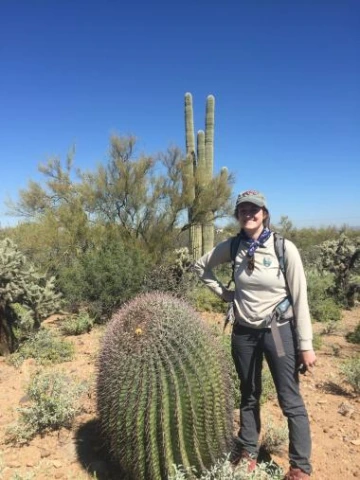
How did you first hear about the Bio/Diversity Project?
I first heard about the Bio/Diversity Project through my department email listserv at the University of Arizona. Prior to the internship I worked as a camp counselor and volunteered with Saguaro National Park. The Bio/Diversity project allowed me to work with kids and experience what it is like to be a classroom teacher.
What was the most rewarding part of the internship?
Definitely my experience teaching K-12 students and working to connect with difficult students. By refusing to give up on their learning, I intentionally encouraged students who were the least invested to try different things.
What was the most challenging part of the internship?
Primarily, being patient with the kids and making sure to not give up on any of my students was difficult. Some of these kids have already been given up on in other situations (by parents, teachers, etc.) and I didn’t want to be another person to give up on them.
Since finishing the Bio/Diversity Project internship, have you completed any additional internships, volunteer, or job opportunities?
I now work as a Next Generation Ranger at Saguaro National Park. Initially when I started as a Next Generation Ranger, I began in the Education department, developing materials for field trips. Soon after, I was offered the opportunity to work with Don Swann in the Resource Management department, where I am able to strengthen my science background and still use my experience as an educator to inform the public of our research.
Tell us a little about your current position.
I currently am working on looking through wildlife camera data to find out if the antelope jackrabbit has been extirpated from the west district of Saguaro National Park. I love working outside and learning from my coworkers! Everyone has expertise in some aspect of biology and it’s awesome learning more. I studied conservation biology in college so I’m lucky to work in my field.
What does it mean to be an alumni of the Bio/Diversity Project? In what ways has this internship shaped you?
I was part of the first semester of the Bio/Diversity Project, so it was cool to test out the structure of the program and help iron out the kinks. The program is clearly working well - having a pipeline for diversity is walking the walk and establishing connections between UA and organizations within Tucson is how I found my current position.
While The Bio/Diversity Project is an environmental science outreach program, it also aims to foster diversity and inclusion in the environmental workforce. Since being part of the program, have you had the opportunity to continue working to foster diversity and inclusivity in any way (e.g., through your job, volunteer activities, etc)?
I think since being involved with this program I have kept the knowledge that inclusive science is the best science and that there is still limited diversity within the park service and other conservation organizations. I think checking your privilege and trying to figure out what advantages you were given that others weren’t is an important step towards bridging that gap.
What would you say to someone who is considering participating in the Bio/Diversity Project?
If you enjoy working with kids, give it a try! Do your homework and be as patient as you can. Don’t give up on difficult kids because they too are capable of being smart leaders.
What's next for you?
I am looking into going back to graduate school in the future and still considering what field of study to pursue. I would like to be involved in any combination of outdoor experiences and teaching.

